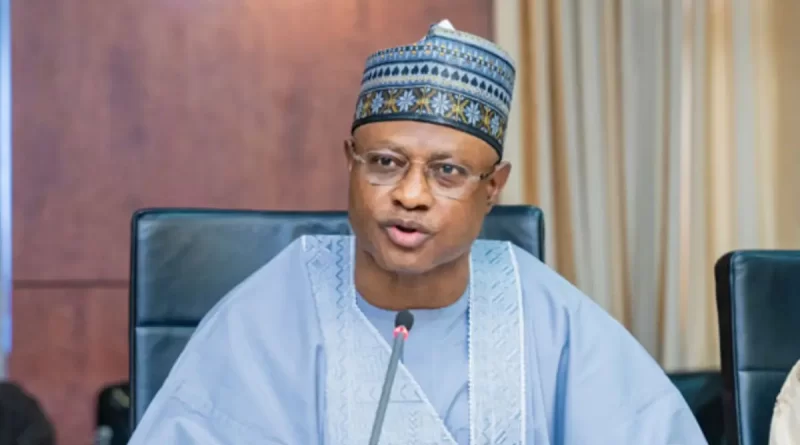Mental health: Uba Sani has set record – KADSAMHSA DG
Governor Uba Sani has overhauled the treatment of substance abuse and mental health into a proactive, integrated, and compassionate public health framework, which is internationally recognised as ‘The Kaduna Model’.
The Director General of Kaduna State Substance Abuse and Mental Health Services Agency (KADSAMHSA), Dr Joseph Ike, made this disclosure at a press briefing on Wednesday as part of the World Mental Health Day.
Dr Ike further disclosed that Governor Uba Sani has established Literacy and Vocational Skills centers to provide critical life skills for those struggling with substance abuse and mental health challenges.
‘’The Rigasa Center recently graduated 200 children from its six-month foundational literacy program. The Unguwan Muazu Center runs an urban agriculture program in fish farming and horticulture, while the Kawo Center is set to train 90 adolescents in jewellery making and hardware repair,’’ he added.
According to Ike, ‘’perhaps the most groundbreaking pillar of the Kaduna Model is the reform of the justice system’s response to drug-related offenses, shifting the paradigm from punitive to rehabilitative.’’
‘’Kaduna State is the first and only jurisdiction in Sub-Saharan Africa to design and implement a comprehensive Alternatives to Incarceration (ATI) program in partnership with the UNODC.
‘’This revolutionary program diverts individuals who commit non-violent, minor offenses due to a substance use disorder, away from the criminal justice system and into mandatory treatment.
‘’This compassionate and pragmatic approach addresses the root cause of criminal behavior, breaking the cycle of addiction and incarceration,’’ he added.
The DG also pointed out that the Governor Uba Sani administration has moved decisively to dismantle an archaic, colonial-era framework and replace it with a modern, rights-based, and integrated system of mental healthcare.
According to him, the centerpiece of this reform is the signing into law of the Kaduna State Mental Health Bill, repealing the oppressive and stigmatizing Lunacy Act of 1954.
The Director General of KADSAMHSA further said that the promulgation of the new law has established a new era that recognizes mental health as a fundamental human right.
Governor Uba Sani has also adopted the World Health Organization’s Mental Health Gap Action Programme (mhGAP), by integrating Mental Health into General Healthcare, he further disclosed.
‘’The inaugural training cohort equipped 100 frontline health workers—doctors, nurses, and pharmacists from 10 General Hospitals— with the skills to diagnose and manage common mental health conditions,” he said.
Explaining the Kaduna Model further, Dr Ike said that it rests on four pillars, including Expanding the Frontiers of Care: A Community-First Approach’; Investing in Our Future: Proactive Youth Prevention; A paradigm Shift In Justice: The Alternatives To Incarceration and From Stigma To Support: Institutionalising Modern Mental Healthcare.
The Director General said that ‘’this framework has been formally recognized by the United Nations Office on Drugs and Crime(UNODC), cementing Kaduna’s position as a national trailblazer.’’
‘’Underscoring this leadership role, Kaduna State is set to host the first-ever North West Governors Forum on Drug Abuse and Security, in partnership with the UNODC, NDLEA, and other international partners,’’ he added.
Dr Ike noted that under Community-First Pillar, the Kaduna Model recognises that cost and distance are the primary barriers to treatment, adding that access to essential services and bringing care directly to the people have been simplified.
‘’In a landmark move, 20 community-based Drop-In Centers were established within existing Primary Health Care (PHC) facilities. By making all services at these centers completely free of charge, the administration has dismantled financial barriers, enabling over 20,000 clients to receive care in the first year alone,’’ he disclosed.
The DG further disclosed that Governor Uba Sani has commissioned the first Community-Based Treatment and Recovery Center in May 2024, to provide a higher level of support.
‘’This facility has already provided intensive, residential rehabilitation to 116 individuals.
“With three additional centers already in the pipeline, the administration is rapidly scaling up its capacity to offer a full spectrum of care, from primary intervention to long-term recovery,” he stated.
According to Dr Ike, the Kaduna Model is also recognises the most effective long-term prevention of substance abuse, by pioneering the Kaduna Children Amplified Prevention System(Kd-CHAMPS).
‘’Developed domestically from the UNODC’s framework, Kd-CHAMPS provides a structure for delivering resilience-building interventions to children and adolescents at every stage of development, including those out of school, with the goal that every child under 18 will have access to at least two evidence-based prevention programs,’’ he added.
The Director General said that the Kaduna Model also has the ‘unplugged’ School-Based drug prevention programme, in partnership with the Ministry of Education and support from the MTN Foundation.
‘’Over 200 teachers have been trained, delivering a life-skills curriculum that has already reached over 17,000 students, equipping them with the tools to resist peer pressure and make healthy choices,’’ he added.
Ike disclosed that Kaduna State is the first location in Africa to implement the UNODC’s LULU sports-based program at a significant scale, adding that ‘’the pilot phase trained 32 community-based coaches and successfully reached 960 at-risk adolescents.’’
